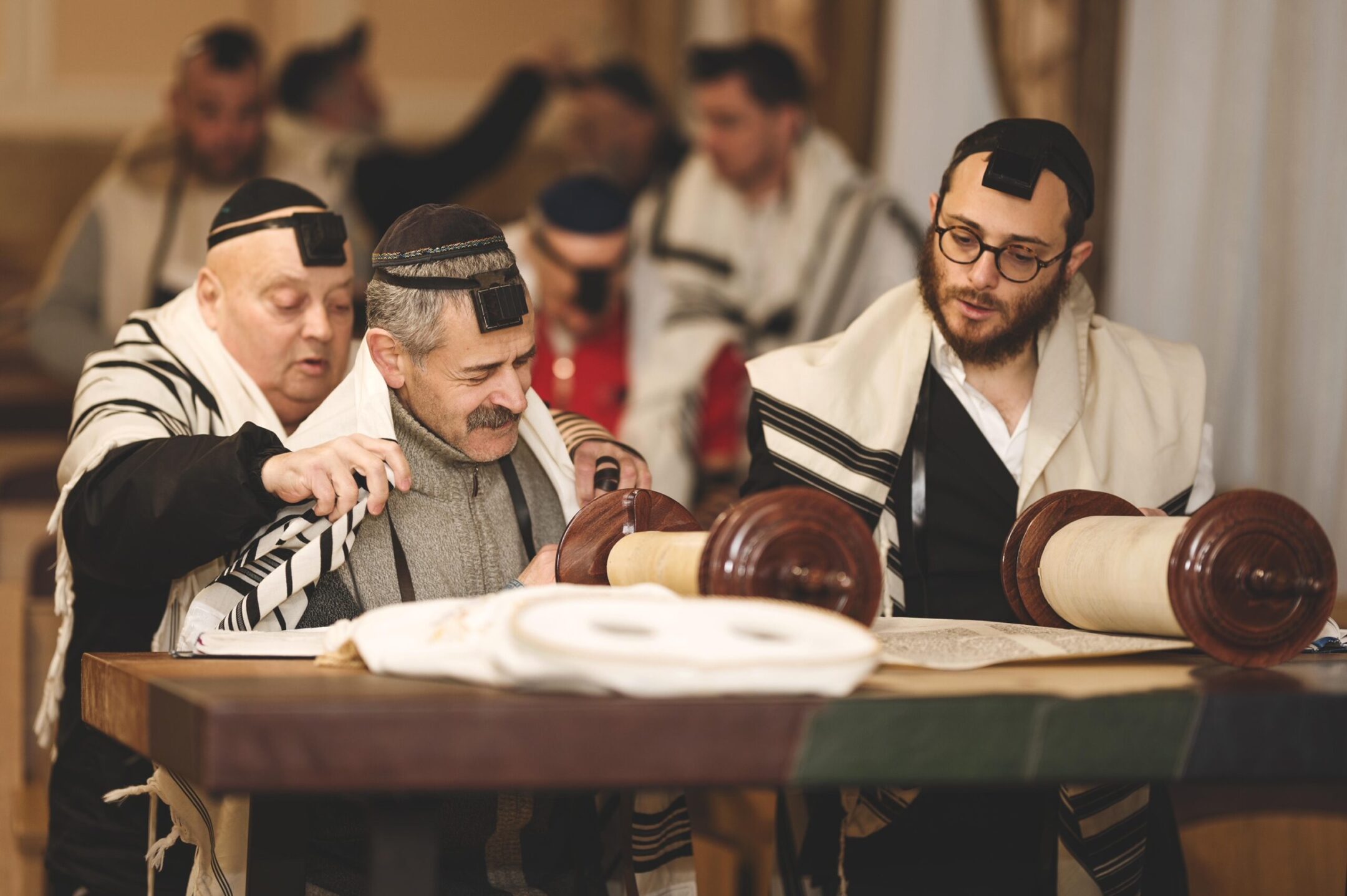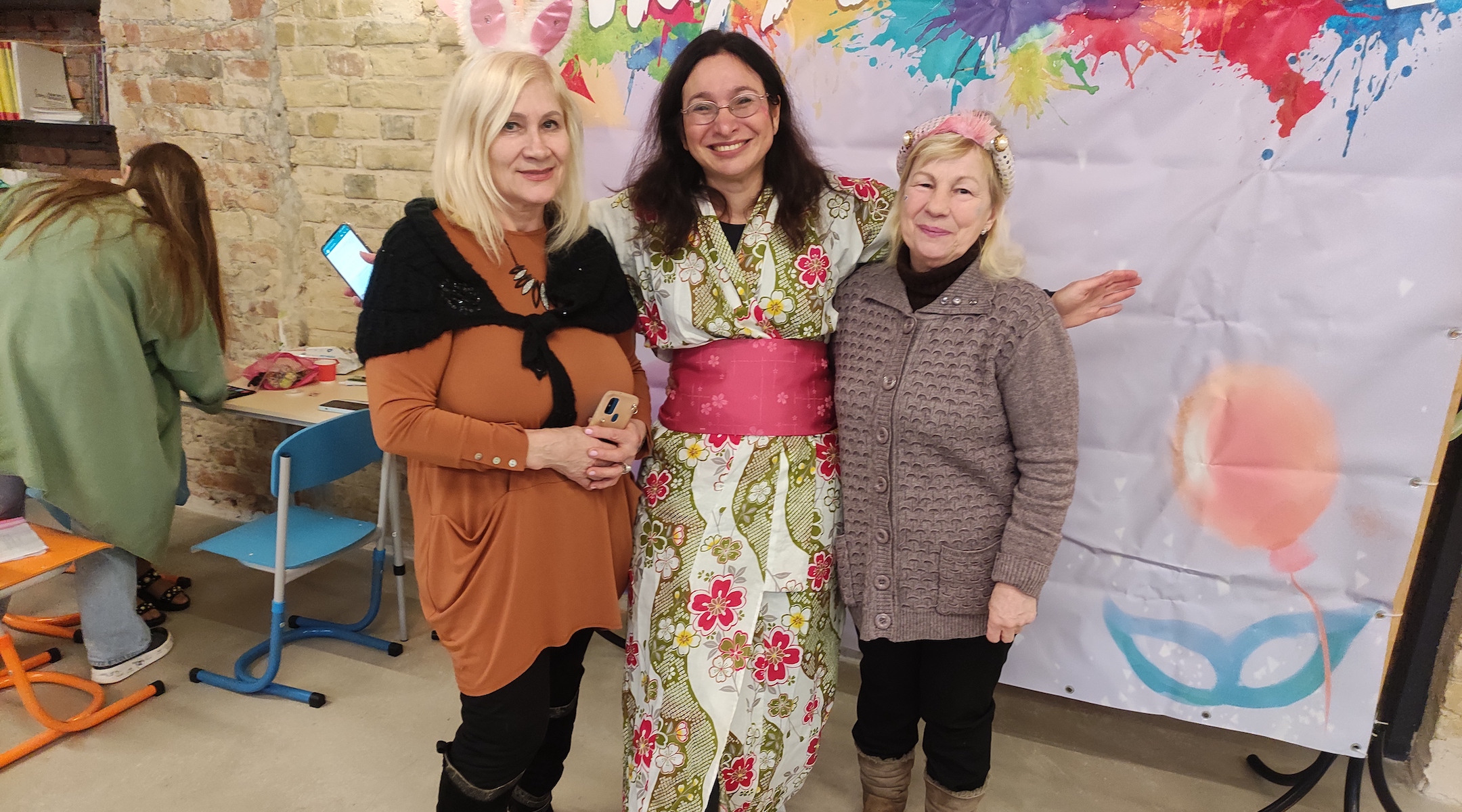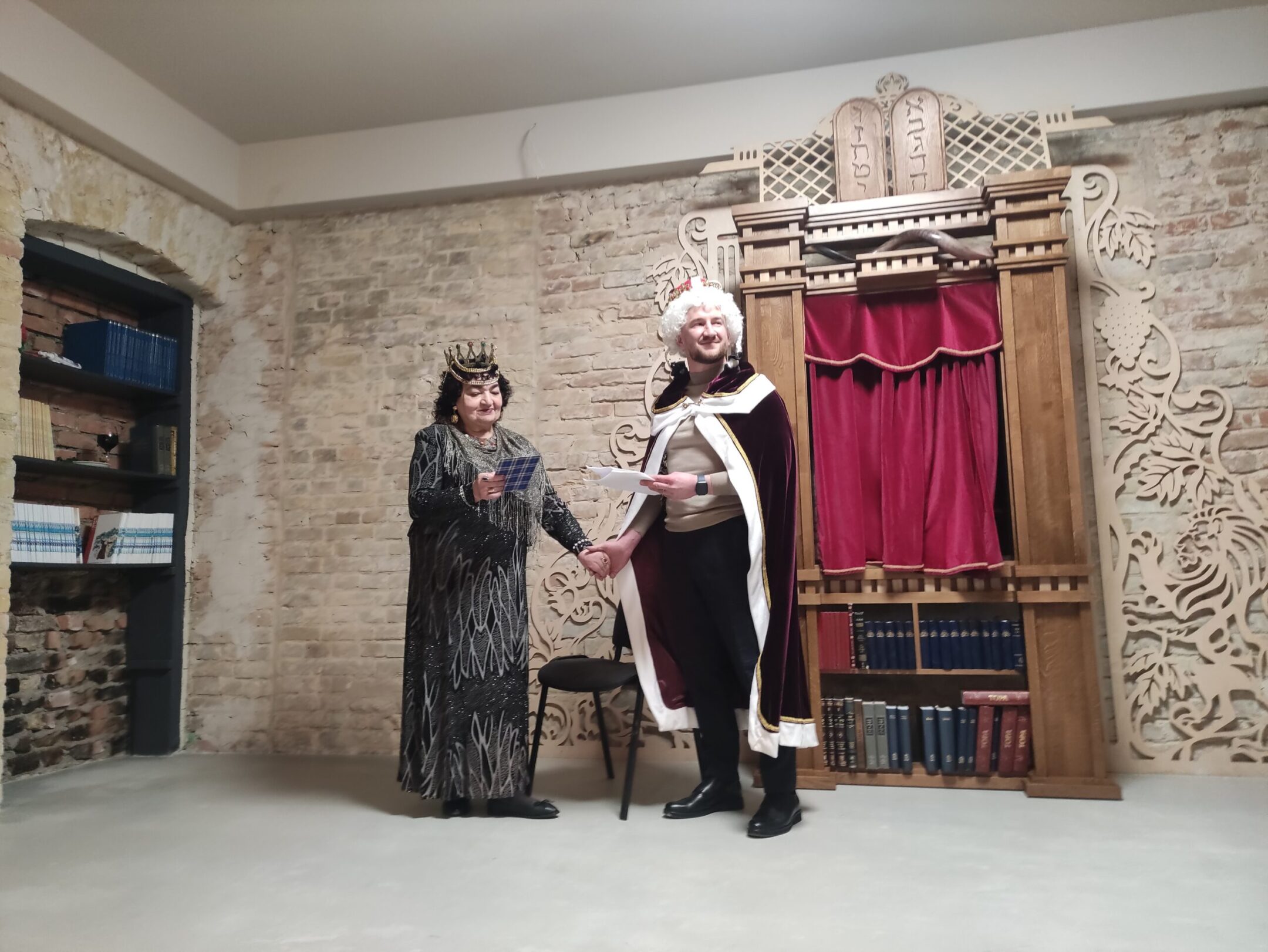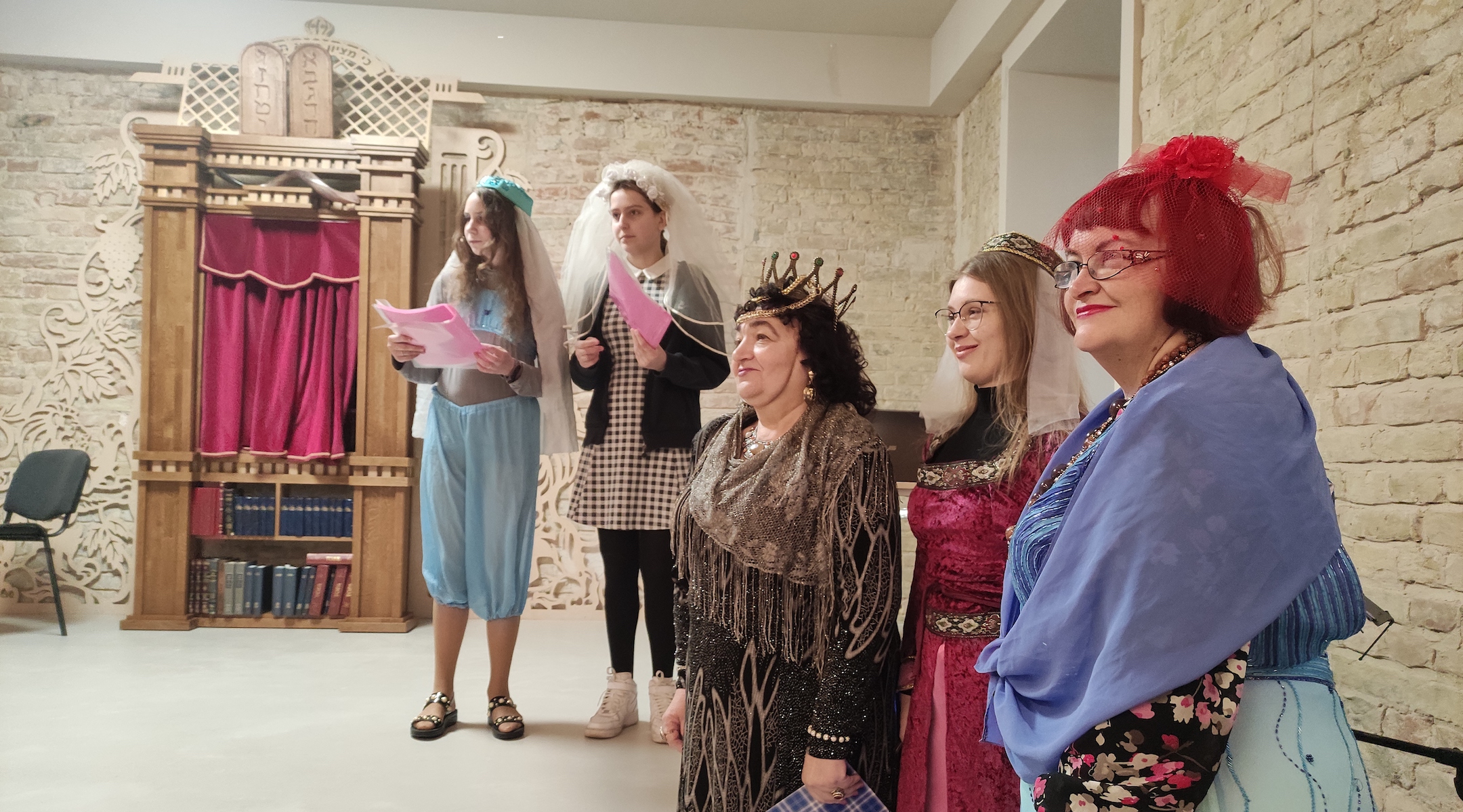KYIV (JTA) — In a historic building in the most industrial part of Podil, the hipster district of Kyiv that once was the heart of the Jewish trading community, a senior and passionate Esther seduces a much younger Ahasuerus. She flirts with the handsome king to the raucous giggling of the audience, which breaks into applause when the Purim shpiel comes to an end.
A year and a few days into Russia’s full-scale invasion of Ukraine, Jews in Kyiv and the rest of the country have celebrated Purim in precarious economic and emotional circumstances, under the continued threat of Russian attacks. Still, many of them are in much better spirits than in 2022, when the Jewish holiday of joy found Ukrainian Jews in a frantic state of worry and uncertainty about their immediate future.
“A year ago you could see the fear in people’s eyes; now they are very proud because Ukraine has resisted, and Jews are fully involved in the cause,” Rabbi Irina Gritsevskaya told the Jewish Telegraphic Agency during the movement’s Purim celebration in Podil. She is Israeli but periodically travels to Ukraine to serve the country’s Masorti communities as the director of the Midreshet Schechter organization. Masorti Judaism is similar to the Conservative movement in the United States.
“Last year it was very, very hard, because people were in shock, afraid, and they didn’t know what to do,” said Ariel Markowitz, a Kyiv rabbi from the Chabad-Lubavitch Orthodox movement, which held its own Purim celebration Monday night. “But now we know that we have a strong army, that we have a chance, and many people have actually returned to Kyiv.”

Rabbi Ariel Markowitz of Chabad Kyiv reads from the Megillah during his community’s Purim celebration, March 6, 2023. (Courtesy Markowitz)
The year-old war has shaken up Ukraine’s Jewish community, with members leaving the country or moving within it to avoid Russian shelling and its effects.
“Everyone has pretty much made a decision on whether to stay or to leave and we are reorganizing our community,” said Gritsevskaya.
Although at least 14,000 Ukrainians have moved to Israel since Russia’s all-out invasion started, and many more thousands have found refuge in Germany and other European countries, Gritsevskaya wants to focus on those who stayed. Estimates of the Jewish population in Ukraine ranged before the war from just under 50,000 to up to 400,000, depending on who counted.
One of the people who left the country was the former Masorti rabbi in Ukraine, Reuven Stamov, who moved with his family to Israel. Currently, the Masorti movement — whose Ukrainian following Grivtseskaya estimates in the thousands — does not have a rabbi permanently in the country. But the community keeps active in Kyiv and other cities, such as Kharkiv in the east, Odessa in the south and Chernivtsi in the southwest, thanks to activists, volunteers and rabbinical students, plus the visits by Gritsevskaya, who first returned for Purim last year.
“Community life has never been so important,” she said.
Gritsevskaya pointed to the difference that having access to material help, connections and emotional and spiritual support makes for those who arrive in new cities from places in the south or the east occupied by Russia or close to the front.
She acknowledged that some Jewish organizations have ceased their operations in Ukraine and stressed the need of strengthening the work of those who are committed to remain, so Jewish life in Ukraine could be as “diverse” as before and people “have options” to choose the way they practice their Judaism.
Among the Ukrainian Jews that decided to stay is the director of the MILI Foundation, the entity that organizes the Masorti community in Ukraine. Maksym Melnikov moved to Kyiv from his native Donetsk in 2014 after Russian-backed separatist militias declared the independence of part of the region and war broke out in Eastern Ukraine.

Rabbi Irina Gritsevskaya poses with community members of the Masorti community in Kyiv, March 6, 2023. (Marcel Gascón Barberá)
“I came when they started to occupy our land in Ukraine,” Melnikov told the Jewish Telegraphic Agency at the Masorti Purim celebration in Kyiv, just before taking the stage to help Gritsevskaya read the Purim Megillah. “Almost a decade later, war came after me to Kyiv, and I don’t want to move this time, I’m staying.”
Since 2014, many of Melnikov’s friends and acquaintances from Donetsk have moved to Kyiv. While Russia’s full-scale invasion has pushed many Jews from Kyiv to move westwards or leave the country, the western city’s communities have received a new infusion of people from the eastern cities more affected by the war.
“Communities are changing constantly countrywide, and we are trying to reach out to those who arrive, both to help them start a new life and to build our community stronger,” said Grivtsevskaya.
She said the Masorti community in Chernivtsi has experienced a notable revival. Situated near the border with Romania, Chernivtsi is one of the few Ukrainian provincial capitals that has not been bombed by Russia, and thousands have moved there. “They have received another family and are very strong right now,” she said about the once-dwindling community in this historical Jewish center, where she hosted a Purim celebration after making her way into Ukraine in March 2022.
The massive uprooting of entire Jewish communities has been experienced keenly by Chabad, which has the largest Jewish presence in the country, with hundreds of emissaries serving Jewish communities in dozens of cities.
“We’ve seen a huge increase in those who come looking for help,” Markowitz told JTA hours before the start of Purim at Chabad’s community center in Kyiv. Many of them, he said, had come from Mariupol, a city bombed into submission by Russia at the beginning of the war.

Scenes of the Purim shpiel at the Masorti community in Kyiv, March 6, 2023. (Marcel Gascón Barberá)
Chabad is one of several organizations providing aid to Ukrainian Jews, including support in obtaining food, medical care and generators that keep power flowing amid widespread outages.
The rise of the demand for these services is not only driven by refugees, but by families and individuals who have lost their source of income due to the economic disruptions caused by the invasion.
“There is inflation, there are less jobs, a lot of companies closed and people lost their jobs or are unable to help their family members,” Markowitz said.
Besides the demographic and economic shake-ups, the war has brought changes in the way Jews relate to their Ukrainian identity. Perhaps the most striking has been a rapid shift away from speaking Russian, the first language of many Ukrainian Jews until recently.
“Even I started learning and speaking Ukrainian and you can definitely see how a new sense of national identity is being born,” Maria Karadin, a Russia-born Israeli who moved to Ukraine with her husband in 2005, said at the Masorti Purim event.
Maiia Malkova is 15 years old and one of the most active young members of the Masorti community in Kyiv.
“Last year I didn’t even think about Purim so much because I was so frightened,” she said while wearing a necklace with a tryzub, the trident that symbolizes Ukrainian statehood and independence. “But we kind of got accustomed to this situation. And it is great to be able to celebrate Purim again.”
JTA has documented Jewish history in real-time for over a century. Keep our journalism strong by joining us in supporting independent, award-winning reporting.






